《威尼斯商人》中的人物分析
《威尼斯商人》人物评析

一、安东尼奥——慷慨、忠贞、鲁莽、愚蠢安东尼奥对待金钱和人情的态度或许值得我们借鉴。
金钱固然重要,可是在这个世界上有许多远远比金钱更重要的东西。
威尼斯商人安东尼奥慷慨仁厚。
淡泊金钱。
例如:他经常无偿借钱给别人而不收取利息:他将意外获得的财产让给了夏洛克的女儿和女婿——罗伦佐。
罗伦佐也是安东尼奥的朋友之一。
他珍惜朋友之间忠贞的友情。
安东尼奥为了朋友可以赴汤蹈火.冒自己的性命去借钱,说明他对朋友讲义气、尊重友谊、不惜牺牲生命。
但是应该看到这个人物在做事方面欠考虑与谋略.并且较鲁莽和冲动.有时显得有些愚蠢。
安东尼奥明知夏洛克是一个势利、贪婪、有仇必报的小人,并且自己和夏洛克积怨已久,但他仍然不加思索、鲁莽地去向夏洛克借钱。
当夏洛克提出了苛刻、令人发指的条件时。
安东尼奥居然能够接受,这也说明了他逆来顺受与愚蠢的心态。
虽然他是为了朋友能够娶上心爱的女人,但是他的做法真的欠妥。
安东尼奥应该以诚相待、开诚布公地把自己的处境告诉给朋友;并劝说朋友用真情去打动那个富有、美丽的女人,而不是用借来的钱去求婚。
毕竟安东尼奥试图用自己生命换来的钱,只是帮朋友求婚,而并不是为了救助真正需要帮助的穷人或做正义的事情:两者性质是截然不同的。
当安东尼奥面对死的威胁时,他具有古罗马英雄那样临危不惧,视死如归的气概;但是死也有重于泰山、轻于鸿毛之分。
毕竟他不是为了正义事业或帮助贫穷受难的人们而去牺牲自己。
他在夏洛克无耻阴谋前。
不知所措、束手无策,显得软弱无力。
二、夏洛克——贪婪、心胸狭窄、残忍冷酷、可悲夏洛克和安东尼奥是两个对立的人物形象.他们对待金钱和人情的态度是截然相反的。
金铃并不是万能的,要知道世界上有些东西是金钱买不到的,例如:亲情、爱情、友谊、幸福等等。
个别人为了获得金钱,不择手段,加害与自己无关的人,或者出卖朋友、亲情;这种行为是不道德的,是可耻的,令人唾弃的。
夏洛克是这一形象的典型代表。
在这个人物身上,几乎看不到亲情和友善;看到的只有贪婪、冷酷以及利欲熏心。
《威尼斯商人》中的人物形象分析
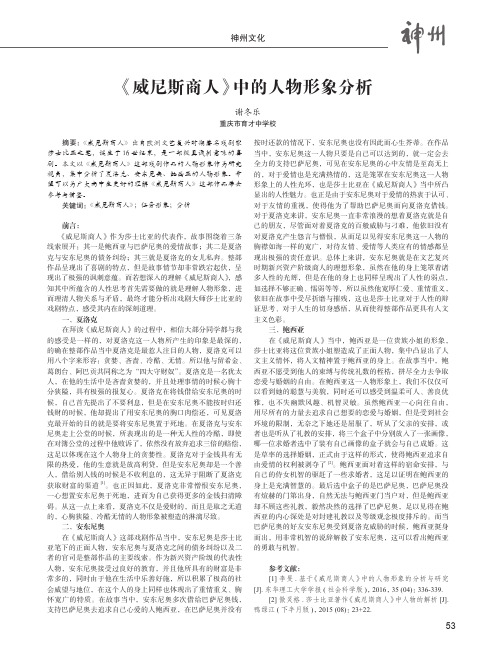
53
神州文化
《威《威尼斯商人》出自欧洲文艺复兴时期著名戏剧家 莎士比亚之笔,诞生于 16 世纪末,是一部极具讽刺意味的喜 剧。本文以《威尼斯商人》这部戏剧作品的人物形象作为研究 视角,集中分析了夏洛克、安东尼奥、鲍西亚的人物形象。希 望可以为广大高中生更好的理解《威尼斯商人》这部作品带去 参考与借鉴。
关键词:《威尼斯商人》;任务形象;分析
前言: 《威尼斯商人》作为莎士比亚的代表作,故事围绕着三条 线索展开:其一是鲍西亚与巴萨尼奥的爱情故事;其二是夏洛 克与安东尼奥的债务纠纷;其三就是夏洛克的女儿私奔。整部 作品呈现出了喜剧的特点,但是故事情节却非常跌宕起伏,呈 现出了极强的讽刺意蕴。而若想深入的理解《威尼斯商人》,感 知其中所蕴含的人性思考首先需要做的就是理解人物形象,进 而理清人物关系与矛盾,最终才能分析出戏剧大师莎士比亚的 戏剧特点,感受其内在的深刻道理。 一、夏洛克 在拜读《威尼斯商人》的过程中,相信大部分同学都与我 的感受是一样的,对夏洛克这一人物所产生的印象是最深的, 的确在整部作品当中夏洛克是最惹人注目的人物,夏洛克可以 用八个字来形容:贪婪、吝啬、冷酷、无情。所以他与留希金、 葛朗台、阿巴贡共同称之为“四大守财奴”。夏洛克是一名犹太 人,在他的生活中是吝啬贪婪的,并且处理事情的时候心胸十 分狭隘,具有极强的报复心。夏洛克在将钱借给安东尼奥的时 候,自己首先提出了不要利息,但是在安东尼奥不能按时归还 钱财的时候,他却提出了用安东尼奥的胸口肉偿还,可见夏洛 克最开始的目的就是要将安东尼奥置于死地。在夏洛克与安东 尼奥走上公堂的时候,所表现出的是一种无人性的冷酷,即使 在对簿公堂的过程中他败诉了,依然没有放弃追求三倍的赔偿, 这足以体现在这个人物身上的贪婪性。夏洛克对于金钱具有无 限的热爱,他的生意就是放高利贷,但是安东尼奥却是一个善 人,借给别人钱的时候是不收利息的,这无异于阻断了夏洛克 获取财富的渠道 [1]。也正因如此,夏洛克非常憎恨安东尼奥, 一心想置安东尼奥于死地,进而为自己获得更多的金钱扫清障 碍。从这一点上来看,夏洛克不仅是爱财的,而且是取之无道 的,心胸狭隘、冷酷无情的人物形象被塑造的淋漓尽致。 二、安东尼奥 在《威尼斯商人》这部戏剧作品当中,安东尼奥是莎士比 亚笔下的正面人物,安东尼奥与夏洛克之间的债务纠纷以及二 者的官司是整部作品的主要线索。作为新兴资产阶级的代表性 人物,安东尼奥接受过良好的教育,并且他所具有的财富是非 常多的,同时由于他在生活中乐善好施,所以积累了极高的社 会威望与地位,在这个人的身上同样也体现出了重情重义、胸 怀宽广的特质。在故事当中,安东尼奥多次借给巴萨尼奥钱, 支持巴萨尼奥去追求自己心爱的人鲍西亚,在巴萨尼奥并没有
《威尼斯商人》中人物形象的研究

《威尼斯商人》中人物形象的研究《威尼斯商人》是莎士比亚的经典悲剧之一,以其丰富的人物形象、复杂的情节和深刻的思想内涵而闻名于世。
在这部作品中,不同的人物形象展现了不同的性格特点和命运轨迹,让人深受触动。
本文将针对《威尼斯商人》中的人物形象展开研究,分析不同角色的性格特点和命运走向,以期更好地理解这部文学作品的内涵和意义。
我们来分析作品中的主要人物形象:安东尼奥、巴萨尼奥、波西亚、西拉尼奥和波特西亚。
安东尼奥是本剧的主人公,他是一位富有、慷慨、高尚的商人,深受人们的尊敬和爱戴。
他与朋友巴萨尼奥的友谊更是众所周知,两人之间情同兄弟,彼此信任和支持。
安东尼奥的一生却因为对波西亚的借贷而陷入了困境,最终导致了他的悲剧命运。
安东尼奥的性格特点是富有同情心、慷慨大方,但也有点冲动和轻信,这使得他在面临波西亚的借贷请求时做出了一个致命的决定。
在整部戏剧中,安东尼奥的形象给人留下了深刻的印象,他的悲剧命运也成为了戏剧的主线。
巴萨尼奥则是作品中另一个重要的人物形象,他是安东尼奥的朋友和忠诚的支持者。
巴萨尼奥对于爱情有着迷人的追求和坚定的信念,他为了追求波西亚的爱情可以不惜一切代价,这种坚定的爱情观念成为了戏剧中的一大亮点。
巴萨尼奥的形象展现了浪漫主义精神和勇气,他的命运也与爱情息息相关,为整部戏剧增添了不少情感色彩。
波西亚则是整部戏剧中的女主角,她的美丽和聪慧成为了诸多男子追求的目标。
在戏剧中,波西亚以她的睿智和机智征服了巴萨尼奥,展现了她的内心世界和情感。
波西亚的形象展现了女性的独立和坚强,她的心智和情感成为了整部戏剧的灵魂。
她的命运与戏剧中的其他人物相互交织,展现了她的坚韧和勇敢。
波西亚的形象给人留下了深刻的印象,她的性格特点和命运走向都成为了整部戏剧的一大亮点。
西拉尼奥则是作品中的反派人物,他是波西亚的追求者和仇敌,经常对安东尼奥和巴萨尼奥采取阴险的手段,企图破坏他们的友谊和爱情。
西拉尼奥的形象具有狡诈和阴险的特点,他的存在为整部戏剧增添了许多冲突和矛盾。
【高中课内阅读】《威尼斯商人》人物形象分析
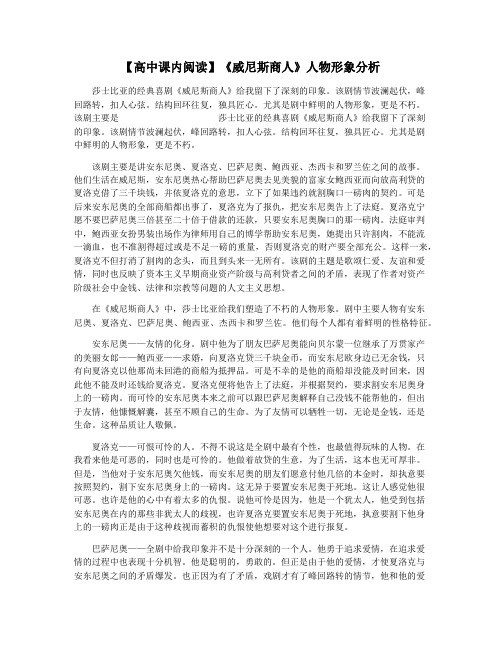
【高中课内阅读】《威尼斯商人》人物形象分析莎士比亚的经典喜剧《威尼斯商人》给我留下了深刻的印象。
该剧情节波澜起伏,峰回路转,扣人心弦。
结构回环往复,独具匠心。
尤其是剧中鲜明的人物形象,更是不朽。
该剧主要是莎士比亚的经典喜剧《威尼斯商人》给我留下了深刻的印象。
该剧情节波澜起伏,峰回路转,扣人心弦。
结构回环往复,独具匠心。
尤其是剧中鲜明的人物形象,更是不朽。
该剧主要是讲安东尼奥、夏洛克、巴萨尼奥、鲍西亚、杰西卡和罗兰佐之间的故事。
他们生活在威尼斯,安东尼奥热心帮助巴萨尼奥去见美貌的富家女鲍西亚而向放高利贷的夏洛克借了三千块钱,并依夏洛克的意思,立下了如果违约就割胸口一磅肉的契约。
可是后来安东尼奥的全部商船都出事了,夏洛克为了报仇,把安东尼奥告上了法庭。
夏洛克宁愿不要巴萨尼奥三倍甚至二十倍于借款的还款,只要安东尼奥胸口的那一磅肉。
法庭审判中,鲍西亚女扮男装出场作为律师用自己的博学帮助安东尼奥,她提出只许割肉,不能流一滴血,也不准割得超过或是不足一磅的重量,否则夏洛克的财产要全部充公。
这样一来,夏洛克不但打消了割肉的念头,而且到头来一无所有。
该剧的主题是歌颂仁爱、友谊和爱情,同时也反映了资本主义早期商业资产阶级与高利贷者之间的矛盾,表现了作者对资产阶级社会中金钱、法律和宗教等问题的人文主义思想。
在《威尼斯商人》中,莎士比亚给我们塑造了不朽的人物形象。
剧中主要人物有安东尼奥、夏洛克、巴萨尼奥、鲍西亚、杰西卡和罗兰佐。
他们每个人都有着鲜明的性格特征。
安东尼奥——友情的化身。
剧中他为了朋友巴萨尼奥能向贝尔蒙一位继承了万贯家产的美丽女郎——鲍西亚——求婚,向夏洛克贷三千块金币,而安东尼欧身边已无余钱,只有向夏洛克以他那尚未回港的商船为抵押品。
可是不幸的是他的商船却没能及时回来,因此他不能及时还钱给夏洛克。
夏洛克便将他告上了法庭,并根据契约,要求割安东尼奥身上的一磅肉。
而可怜的安东尼奥本来之前可以跟巴萨尼奥解释自己没钱不能帮他的,但出于友情,他慷慨解囊,甚至不顾自己的生命。
《威尼斯商人》中人物形象的研究
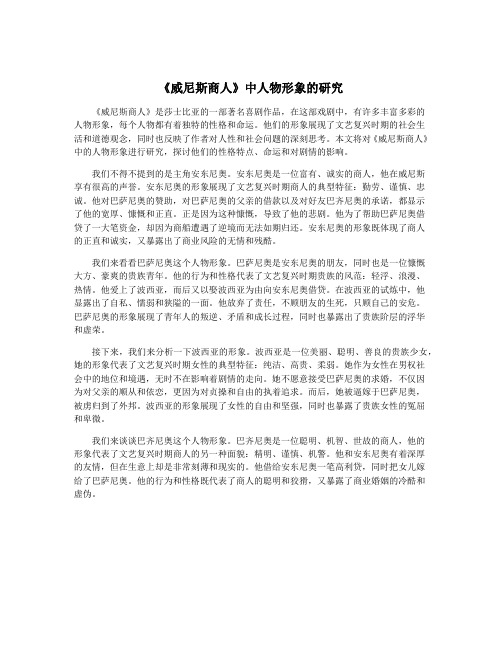
《威尼斯商人》中人物形象的研究《威尼斯商人》是莎士比亚的一部著名喜剧作品,在这部戏剧中,有许多丰富多彩的人物形象,每个人物都有着独特的性格和命运。
他们的形象展现了文艺复兴时期的社会生活和道德观念,同时也反映了作者对人性和社会问题的深刻思考。
本文将对《威尼斯商人》中的人物形象进行研究,探讨他们的性格特点、命运和对剧情的影响。
我们不得不提到的是主角安东尼奥。
安东尼奥是一位富有、诚实的商人,他在威尼斯享有很高的声誉。
安东尼奥的形象展现了文艺复兴时期商人的典型特征:勤劳、谨慎、忠诚。
他对巴萨尼奥的赞助,对巴萨尼奥的父亲的借款以及对好友巴齐尼奥的承诺,都显示了他的宽厚、慷慨和正直。
正是因为这种慷慨,导致了他的悲剧。
他为了帮助巴萨尼奥借贷了一大笔资金,却因为商船遭遇了逆境而无法如期归还。
安东尼奥的形象既体现了商人的正直和诚实,又暴露出了商业风险的无情和残酷。
我们来看看巴萨尼奥这个人物形象。
巴萨尼奥是安东尼奥的朋友,同时也是一位慷慨大方、豪爽的贵族青年。
他的行为和性格代表了文艺复兴时期贵族的风范:轻浮、浪漫、热情。
他爱上了波西亚,而后又以娶波西亚为由向安东尼奥借贷。
在波西亚的试炼中,他显露出了自私、懦弱和狭隘的一面。
他放弃了责任,不顾朋友的生死,只顾自己的安危。
巴萨尼奥的形象展现了青年人的叛逆、矛盾和成长过程,同时也暴露出了贵族阶层的浮华和虚荣。
接下来,我们来分析一下波西亚的形象。
波西亚是一位美丽、聪明、善良的贵族少女,她的形象代表了文艺复兴时期女性的典型特征:纯洁、高贵、柔弱。
她作为女性在男权社会中的地位和境遇,无时不在影响着剧情的走向。
她不愿意接受巴萨尼奥的求婚,不仅因为对父亲的顺从和依恋,更因为对贞操和自由的执着追求。
而后,她被逼嫁于巴萨尼奥,被虏归到了外邦。
波西亚的形象展现了女性的自由和坚强,同时也暴露了贵族女性的冤屈和卑微。
我们来谈谈巴齐尼奥这个人物形象。
巴齐尼奥是一位聪明、机智、世故的商人,他的形象代表了文艺复兴时期商人的另一种面貌:精明、谨慎、机警。
《威尼斯商人》人物评析-生活类
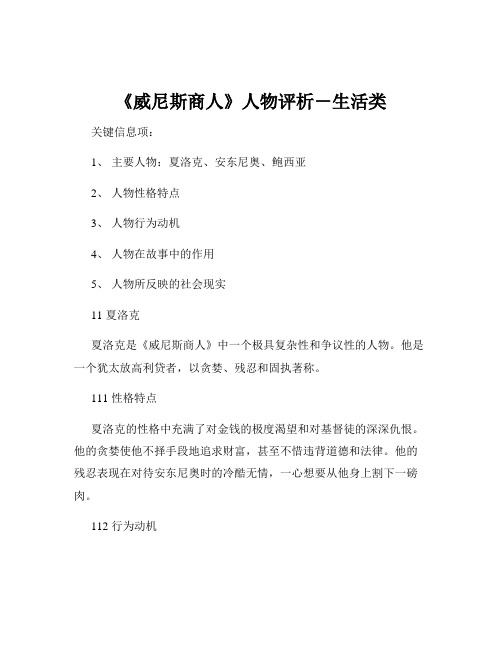
《威尼斯商人》人物评析-生活类关键信息项:1、主要人物:夏洛克、安东尼奥、鲍西亚2、人物性格特点3、人物行为动机4、人物在故事中的作用5、人物所反映的社会现实11 夏洛克夏洛克是《威尼斯商人》中一个极具复杂性和争议性的人物。
他是一个犹太放高利贷者,以贪婪、残忍和固执著称。
111 性格特点夏洛克的性格中充满了对金钱的极度渴望和对基督徒的深深仇恨。
他的贪婪使他不择手段地追求财富,甚至不惜违背道德和法律。
他的残忍表现在对待安东尼奥时的冷酷无情,一心想要从他身上割下一磅肉。
112 行为动机他的行为动机主要源于长期受到的社会歧视和压迫。
作为犹太人,他在威尼斯社会中处于边缘地位,受到基督徒的歧视和不公对待。
这种经历使他内心充满了怨恨和复仇的欲望。
113 在故事中的作用夏洛克的存在推动了剧情的发展,他与安东尼奥的债务纠纷构成了故事的核心冲突。
他的形象也反映了当时社会中宗教和种族之间的紧张关系。
114 反映的社会现实夏洛克的遭遇揭示了当时社会对犹太人的不公正待遇,以及宗教偏见所带来的危害。
12 安东尼奥安东尼奥是一位善良、慷慨的商人。
121 性格特点他为人友善,重视友情,对待朋友真诚无私。
他的慷慨体现在他经常无偿地帮助他人,尤其是那些处于困境中的人。
122 行为动机他的行为动机主要源于他内心的善良和对友情的珍视。
他愿意为了帮助朋友巴萨尼奥而向夏洛克借款,甚至不惜冒着生命危险。
123 在故事中的作用安东尼奥是故事中的正面人物代表,他的遭遇引起了观众的同情,也展现了人性的美好一面。
124 反映的社会现实安东尼奥的形象反映了当时商业社会中人与人之间的互助和友情的重要性。
13 鲍西亚鲍西亚是一位聪明、勇敢、机智的女性。
131 性格特点她聪明伶俐,具有敏锐的洞察力和出色的辩论能力。
她勇敢地面对困难,敢于挑战权威。
132 行为动机她的行为动机是为了维护正义和帮助自己所爱的人。
她运用自己的智慧和勇气,成功地化解了安东尼奥的危机。
《威尼斯商人》中的人物形象分析

摘要众所周知,《威尼斯商人》是莎士比亚著名喜剧之一。
该剧的主题被定义为对善良、友谊和爱情的颂扬。
本剧不但反映了资本主义早期资产阶级同高利贷者间的矛盾冲突,也揭示了作者对资本主义社会金钱、法律和宗教信仰的人文主义观点。
本论文采用了个案分析法以及对比分析法对该剧的主要人物形象作了一一剖析,展示了资本主义萌芽时期人文主义的浓厚气息,表达了莎士比亚对社会、对人类生活的反思,并寄以自己的理想。
课题对封建旧势力的代表——夏洛克作了无情的批判,而对形象鲜明、富有光彩的鲍西娅则添上了浓厚的人文主义理想色彩。
文章彰显了女性个性解放,突显了文艺复兴时期伊丽莎白当权期,女性地位、意识的重大突破。
关键词:人物分析;人文主义思想;个性解放;女性意识AbstractAs we known that the merchant of V enice is one of Shakespeare‟s most important works. It is a comedy. The theme of this play is to extol kindheartedness, friendship and love. And also it reflects the conflicts between the capitalists and usurers at the beginning of the capitalist society. And it expresses the author‟s humanist idea on money, law and religion in capitalist society. This thesis analyzes the main figures in the play by using independent and contrast ways. It shows the heavily flavor of humanism at the beginning of capitalist society; and expresses some thoughts for society and human being. The thesis also makes a hard criticism to Shylock, who is a representative of feudalism, and puts a heavy humanism on Portia. It displays the thoughts of feudalism personality liberation, and stressing the great breakthrough of woman‟s status and feminine consciousness in Elizabethan era.Key Words:Character analyzing; humanism; personality liberation; women consciousnessIntroductionThe Merchant of Venice is one of the Shakespeare‟s famous comedies in his early time. It‟s theme is to extol kindness, friendship and love. It is the mirror of the contradiction between business bourgeois and usurer at the beginning of the Capitalist society. It‟s also expressed the author‟s humanism ideas on money, law and religion in this society. There, we mention Humanism--the main distinguishing feature of that period, also the brightness characteristic which is shown from the important role in this play.In this thesis, the author introduces the background of the play firstly. Reading the play, we can know that the social background in the play is according with the real society. We know at that time, the society was under the leadership of Elizabeth who was the symbol of power in England. Next the thesis gives an introduction of the main figures in the play. Antonio is rich and kindhearted. From him we can see the spirit of humanism. Portia plays the most important part in the play. The thesis talks about her character, her hobbies, and her attitude of love and the inner meaning-humanism of this figure. She is the center of all these figures the play refers to. Humanism is an ideological weapon for capitalism to fight the feudalism combat, and also it is the core idea of capitalism advanced-literature in Renaissance, and its combat refers to the ideal of Feudalism in Middle Age, especially the religion belief of Catholics. After that, the thesis gives more details about the information mentioned above. Then the thesis compares the figures to give a highlight of the humanism spirit.Ⅰ. Social Background of the Play the Merchant of VeniceAs is known, England is a developed country. Today, it also obtains very important status in the world. It is very necessary to talk about the history of the growth of capitalism in England, especially in 16th century.A. The Social Information in Elizabeth ThroneHenry VIII died in 1547 and his nine-year-old son succeeded him. The son was known in history, Edward Ⅵ. The boy-king‟s reign was a time of extreme Protestantism, for the Regency Council for him consisted almost entirely of the protestant faction. Edward Ⅵdied in 1553. only 15years old. Then his half-sister, Mary, a Catholic, became Queen. The new Queen came to the throne at the age of twenty-five. After the coronation, her parliament passed the necessary legislation to abolish the papal supremacy over the church, and gave Elizabeth all the powers over the church which her father had held, though with the more modest title of “Supreme Government” of the Church of England instead of “Supreme Head” Elizabeth died on 24 March, 1603 at the age of sixty-nine. Her forty-four-year reign had not only ensured the triumph of Protestantism in Britain and in Northern Europe, but had greatly increased the wealth, power and prestige of England. Her na vy triumphed over the great Armada of the king of Spain; her sailors‟ circum navigated the world, and established a colony on the North American continent which they named Virginia after their virgin queen. At home, the merchants were prosperous; the common people enjoyed a higher standard of living than in most other European countries, and her reign was also full of achievements in literature and other arts. After all, Elizabeth I was one of the most successful despots to govern England in English history. ①(李超, 邓兴义:34-37)B. Special Social Background Reflecting in the Merchant of VeniceThe Merchant of Venice is one of the famous comedy plays written by Shakespeare in his early time. The theme of this play is to extol kindness, friendship and love. It is the mirror of the contradiction between business bourgeois and usurer at the beginning of capitalist society. It‟s also expressed the author‟s humanism ideas on money, law and religion in this society. There, we mention Humanism--the main distinguishing feature of that period, also the brightness characteristic which is shown from the important roles in this play. But, what is “humanism”? Humanism is the ideological weapon of bourgeois to fight feudalism at Renaissance, is also the core idea of the bourgeois‟ advanced-literature in this time. Be directed against the world outlook of Medieval feudalism is the spearhead of struggle, especially the religion belief of Catholicism. Church refers to God as the centre of cosmos. At the heart of the Renaissance philosophy is the assertion of the greatness of man. And the elements of Humanism are to establish the central status of human, their dignity and value, to advocate the spirit of rationalism and science and to protest the supreme role of God admired in Middle Ages.Shakespeare was a man of the late Renaissance who gave the fullest expression to humanist ideas. The Merchant of Venice is one of the important works which finished in the First Flowering period of English Literature. In this play, heroes and heroines fight for their own ideas and mould their own life according to their own free will and bring us into happy and ideal world with singing, dancing, harmony with nature and freedom from the vices of the world.Ⅱ. Analyzing the Heroes in the PlayIn this play, Shakespeare portrays many roles. The proportion that male figures taking is much more notable than female‟s. So, it's necessary to narrate and displ ay their nature character and symbol.A. AntonioAlthough the play‟s title refers to him, Antonio is a rather lackluster character. He emerges in ActⅠ, sceneⅠas a hopeless depressive, someone who cannot name the source of his melancholy and who, throughout the course of the play, devolves into a self-pitying lump, unable to muster the energy required to defend himself against execution. Antonio never names the cause of his melancholy, but the evidence seems to point to his being in love, and the most likely object of his affection is Bassanio.Antonio has risked the entirety of his fortune on oversea trading ventures, yet he agrees to guarantee the potentially lethal loan Bassanio secures from Shylock. He is willing to offer up a pound of flesh, signifying a union that grotesquely alludes to the rite of marriage, where two partners become “one flesh”. Further evidence of the nature of Antonio‟s feelings for Bassanio appears later in the play, when Antonio‟s proclamat ions resonate with the hyperbole and self-satisfaction of a doomed lover‟s declaration: “pray God Bassanio come/ To see me pay his debt, and then I care not”②(Act Ⅲ, Scene III, 35-36) without a mate, he is indeed the “tainted wether”—or castrated ram—of the flock, and he will likely return to his favorite pastime of moping about the streets of Venice②(Act Ⅳ, Scene I, 113). After all, he has effectively disabled himself from pursuing hid hobby—abusing Shylock—by insisting that the Jew convert to Christianity. Although a 16th century audience might have seen this demand as merciful, as Shylock is saving himself from eternal damnation by converting, we are less likely to be convinced. Not only does Antonio‟s reputation as an anti-Semite precede him, but the only instance in the play when he breaks out of his doldrums in his “storm” against Shylock②(ActⅠ, Scene III, 132). In this play, Antonio proves his character is melancholy, cruelty and some seldom saying—homosexual.B. BassanioIt is said Middle Ages is th e most deathly stillness period in Europe. It also can be seemed it‟s the time that west Europe‟s culture and literature go to grave. As to the pillar of spirit, there is nothing except a total series of religious doctrine. In this environment, people used compliment and boast words to exchange their minds and thoughts. In that society, everyone remain under artificial mask wandered in different kinds of occasion. An absolutely undisguised money relationship makes the true human nature into ash during the masks scraped each other. Bassanio, a noble who is neatly dressed, whose speech and deportment is natural and graceful, gradually becomes a declining aristocrat by spending without restraint. He is a handsome and intelligent young man. But living in such a society, what his every day‟s schedule is to squander money on different meeting and use blandishment speech to talk with other aristocrat. His property is limitation. Once he runs behind his expenses, he will ask his best friend—the wealth merchant in Venice—Antonio for money. From the context, it seems he never returned what he borrowed. To be such a man who wants of lofty aspiration. Maybe the best method frees himself from poverty is to get a profitable marriage. And we mostly can make sure; to obtain money is more important than to marry Portia. This can be improved in later—he gives his bride‟s ring to the clerk. Although his lover has declared that if he loses her ring, she will never pardon him.C. ShylockShylock in this play is the antagonist. He is the model of usurer. Most people read him as a bogeyman, a clownish Jewish stereotype. He is selfish, curtly, avaricious and niggard. Once he hasthe chance to revenge his foe. He will try his best to make the other into deathtrap. In the court, he is clam and wisdom, even fights for several Christian‟s joint attack. But most of his speech is coarse, and sometimes “mean”. All of this makes people take unkindly to him. But with the several aspects sagacious with Antonio, it makes him be a mult-personality figure. Being a pagan who lives in Christian society he has strong emotion on racial constriction and the enthusiasm of raising Jewish people‟s status. Living in this soci ety, he suffers too much public humiliation and oppression as he says in the following:“He hath disgraced me, and hinder‟d me half a million; laught at my loss, mockt at my gains, scorn‟d my nation, thwarted my bargains, cooled my friends, heated mine enemies; and what‟s his reason? I am a Jew. Hath not a Jew eyes? Hath not a Jew hands, organs, dimensions, senses, affections, passions? Fed with the same food, hurt with the same weapons, subject to the same diseases, heal‟d by the same means, warm‟d and cool‟d by the same winter and summer, as a Christian is? If you prick us, do we not bleed? If you tickle us, do we not laught? If you porion us, do we not die? And if you wrong us, shall we not revenge?” ②(Act ⅢSceneⅠ50-63)His frequently mentions of the cruelty he has endured at Christian hands make it hard for us to label him a natural born monster. Shylock argues that Jews are humans and calls his quest for vengeance the product of lessons taught to him by the cruelty of Venice citizens. In such condition, his “malicious” is much more reasonable.Besides the facial of Shylock‟s malignance, actually, he is a person whose sense of decency has been fractured by the persecution he endures. Comparatively, those kindness and wisdom Christian, in fact, have another hideous feature. So, in my mind, Shylock is a man who is worth sympathizing.III. Analyzing the Central Character in the Novel--PortiaThe girl embodies the virtues that are typical for Shakespeare‟s heroines--it has no surprise that she emerges as the antidote to Shylock‟s malice. She is the pretty-witted aristocrat young girl. She is enthusiasm and graceful; resourceful and humorous; wealthy and beautiful. She is the perfect female who glitters the humanism ideal in her life. This is Portia.A. The Essential Nature of PortiaAt the beginning of the play, however, we do not see Portia‟s potential for initiative and resourcefulness, as she is a near prisoner, feeling herself absolutely bound to follow her father‟s dying wishes. This open appearance, however, proves to be a revealing introduction to Portia, who emerges as that rarest of combinations--a free spirit who abides rigidly by rules. When Bassanio asks Belmont to choose his chest, she proves herself to be highly resourceful, begging the man she lo ves to stay a while before picking a chest, and finding loophole in the will‟s provision that we never thought possible. Also, in her defeat of Shylock, she prevails by applying a more rigid standard than Shylock, agreeing that he can get a pound of flesh, but adding that it does not to allow for any loss of blood. Anybody can break the rules, but Portia‟s effectiveness comes from her ability to make the law work for her. After depriving Bassanio of his ring, she stops the prank before it goes far, and she even insinuates that she has been unfaithful. These entire can proves Portia‟s wit, resource, and humorB. The Humanism Spirit Shown by PortiaPortia is the main character in this play. She embodies the virtues that are typical for Shakespeare‟s heroines. Being a wealth young girl, she is beautiful, gentle and tender, and full ofstratagems. She lives in Belmont--a peaceful world, and recruits the newest ideological trends. So, her mind is equipped by humanism. She is a cute girl, even her father‟s behest; she would like to abide by. Humanism has several contents. One of them is the Rationalism object to Obscurantism. It advocates treasuring people intelligent. And it is said the most reason of people is dignity depending on the power of rational. Rational is human‟s nature, science is the source of joyful. So, when Bassanio arrives, Portia use her resourceful mind to call his attention to pick the correct chest.I pray you, tarry: pause a day or twoBefore you hazard; for, in choosing wrong,I lost your company: therefore, forbear a while. ②(Act ⅢSceneⅡ1-5)……Before you venture for me. I could teach youHow to choose right……The seeming truth which cunning times put onTo entrap the wisest. Therefore, thou gaudy gold,Hard food for Midas, I will none of thee;Nor none of thee, thou stale and common drudge,Tween man and man: but thou, thou meager lead,Which rather threatenest than dost promise aught,Thy paleness moves me more than eloquence;And here choose I: ---Joy be the consequence! ②(Act ⅢSceneⅡ100-107)This is the evidence that Portia never resigns herself to her fate. In order to peruse her own happiness and love, she makes use of her wisdom obeyed her father‟s will as well as marry with the Mr. Right. This is one aspect. The other one is that when she argued with Shylock to act defense as a means of attack on the court, and consolidate at every step. Shylock thought he encountered bosom friend at beginning. And later, suddenly he realized he has lost his preponderance. Portia‟s brilliance talent and Shylock‟s weakened defense, both make people cannot help laughing. Considered her attitude towards love and the performance she acts on court. There is no doubt that she is a remarkable humanist.C. Portia--a Self-conscious FemalePortia is a beautiful, dignity and wealth girl. And the most important thing is she obtains strongly female self-consciousness. She knows what is she needs, and try her best to pursue. She has an insight into the world which she exists—the code of ethics, the value…, she knows what‟s the role she plays. So, she can vacillate freely in the male society, gets her goal and not to go against the rules. In this play, it seems she just does two things: help her to choose a husband; help her husband to rescue Antonio. Both of them have fully demonstrated her intelligence, and reveal her anti-tradition figure. It‟s the time when she chooses her hus band to show her ability to suit male society. Portia not only has the female self-consciousness, but also understands thoroughly what is the status and role woman obtains in male society. She knows the method which keeps away from conflicts. To her husband, she is an angle: sheepish, tender and obedient. When Bassanio chooses the correct casket, she immediately says she is an “unwise, lack-education girl”. Is she really so humble? No. Portia knows very clearly that man dislikes woman is more sensibleand prior than men themselves. So she makes her modest on purpose. But at the same she would like to show her important role when she gives her ring to Bassanio, she says:Myself and what is mine to you and yoursIs now converted: but now I was the lordOf this fair mansion, master of my servants,Queen O‟er myself; and even now, but now,This house, these servants, and this same myself,Are yours, my lord: I give them with this ring;Which when you part from, lose, or give away,Let it persage the ruin of your love,And be my vantage to exclaim on you.②The aim to be said like that is to remind Bassanio she is the very one that‟s thereal master in her family. In other words, she is the protagonist in the play, and the male is the costar who stands on the pasive, subordinary rim, and they always do as one is told. This figure-portray denied the traditon gender relationship makes female go from “rim” to “center”, from “object” to “subject”. It’s to deny the traditio nal female conception. And on the other hand, all of those shows Portia is a personality liberation woman.D. An Explanation on Portia Masquerading as ManThe period when the Merchant of Venice was created was called Shakespeare‟s comedy period. During this period Shakespeare shaped humanities and the arts. British Queen Elizabeth I is in the heyday of the rule, monarchy solid and economic prosperity. Shakespeare in the social reality of the ideals of humanism will be achieved confidence, optimism works filled with forthright and bright colors. There is an idiom said “British is the paradise for woman, and the hell for steed” , which means British female enjoy more free than male, and usually male should adhere to their wife. And the fact related to this is woman benefited more education, especially humanism. Most of Shakespeare‟s heroines have been considered the model of Queen Elizabeth.③In the Merchant of Venice, Portia is a miss in a noble family. She is bored with spoon. Her nature is lovely, smart, and witty and evens some naughty. Her homeland is splendid and luxurious. Having some propriety status, Portia worries about nothing, and even late when she chooses her husband, she doesn‟t think it‟s necessary to choose someone who have the equal socioeconomic status. This is one reason why Portia would show her heart to Bassanio--a declining noble. Absorbing the latest ideology, her ideological level has been improved very high. She is intelligent and resourceful. When she has known her husband‟s best friend have been accused. In her mind, a good idea has been emerged prior to go to court and fight against Shylock.But there is the key problem--why does Portia masquerade as man? Wouldn‟t she go to the court with her own dress? Why should she disguise herself as a black-robed judge? These are the complicated questions in the context. In my opinion, there are three reasons to explain this phenomenon.It is the fact that woman‟s status has been improved a lot, especially at Elizabeth‟srealm. There is another important factor about Shakespeare‟s comedy is “heroes in dress” as one says: “British are the paradise for woman and the hell for steed”. In Shakespeare‟s comedy, female not only is the protagonist, but also holds the thread of details, and very erudite. Portia dresses in black robe, the first function is to pile comedy effect on, and throws the comedy atmosphere intosharp relief. The second function is the following: because humanism consists that the world they inhabit is not to despise but to question, explore, and enjoy. Thus, by emphasizing the dignity of human beings and the importance of the present life, they voice their beliefs that man does not only have the right to enjoy the beauty of this life, but has the ability to perfect himself and to perform wonders. And advocate that woman should be treated equal to man. Human is bored equal.④Shakespeare creates Portia, and gives her the endowment to dress up as man. And by using her unruly female speech, the function is to emphasize woman should be treated equally to man. Even sometimes woman is much more excellent than man. Maybe this is the Shakespeare‟s (as a humanist) expectation. The last but not the least function is: although woman‟s status has been promoted, and the humanism ideological wave is sticking strongly out at the feudalism. Males and females treated differently have deep roots in everybody‟s mind, including females themselves. Portia is clever enough. But she still is a people in the world. She also must obey the rules of convention. Some critics say:“When Elizabeth Ⅰ, ruled the realm, the majority of woman found their access to the public sphere decreasing, as the economic roles they played in the late medieval period contracted. Recurrent inflation, land shortages and poverty combined to create a …crisis of order‟, though it developed new, and in some cases quite subtle, tactics for enforcing the subordination of woman. Although the protestant belief in the spiritual equality of men and women according some women greater spiritual dignity and power, and fostered as well a more …companionate‟ and affectionate mode of marriage, th ese gains did not translate into economic, political, or social equality”⑤( Susan Amussen, 1988 and Merry E.Weisner, 1993)At the back of Portia‟s immortality, the play shows us the woman‟s bitter which they have beard so long. As an excellent girl, she ca n‟t enter court naturally, instead she masquerades as man. To establish the central status of human, their dignity and value; to advocate the love and equality; and of these are just to work for the expectation and demand of man, there is no business of woman. Above all, there is the plot that Portia masquerades as man in the play.IV. A Comparative Study of Characteristic DifferencesAs we know, this comedy is very light and joyful. Also its theme is very clean. But many criticisms have analyzed the figure s in different angles. So it‟s inevitable to make a comparison among the roles.A. Portia and JessicaBoth of them are the important roles in this play. And both have a wealth father. The basic difference is Portia living in Belmont, a peaceful, quiet place. And Jessica lives in Venice, which is a city full of pedal, bourgeoisie and smell of money. As we say…circumstance creates human‟ Portia is witty, brave, and humorous, and there is always a clever maid for company. They enjoy themselves and live a very happy life. By contrast, Jessica, a lonely girl, because of her father‟s niggard and heartless, she has no friend. What she does everyday is just stay at home where is a place called …gloomy jail‟. She can‟t go out to have a play; even can‟t open the windo w to have a breath. Her father always worry someone will steal their money and jewels. Shylock is the awful father to her. She never dears to say no to her father. So, when she encounters her love---a Christian young man, Lorenzo. She has nothing to do just packs some money and elopes with him: Jessica: Alack, what heinous sin is it in meTo be ashamed to be my father‟s child!But though I am a daughter to his blood.I am not to his manners. Oh, Lorenzo,If thou keep promise, I will end this strife,Become a Christian and thy loving wife!②( Act II ,Scene III, P64, 15-22)Here, we can say, the two girls have courage to pursue their own happiness. But Portia‟s happiness is hinge on her wit. Although she is bound to her dead father‟s will. She still helps Bass anio to choose the correct chest with her wit. To audience, it‟s more gratification to be accepted. And it‟s a pity for Jessica to choose the elopement for their love.B. Portia and ShylockPortia is a humanist and she is the embodiment of kind, clever, and bravery. She is the person who is leading the trend of society, also we call her “trend—setter”. By contrast, Shylock stands for usurer who is ignorant and backward. Absolutely, they are run in the opposite direction. This is the knot that they will conflict directly. The wonderful performance of their conflicts is shown on Scene Ⅳ—the struggle on court. The way that Portia crosses sword with Shylock is similar to Duke with he. Both persuade him first. The little difference is Duke has no alternative and Portia has a well-thought-out plan. She wins the case with her wit. We can‟t hold ourselves to think Shylock is defeated by a girl who is as old as his daughter. At that time, he has just lost his daughter. What a pity it is! And at last, Shylock loses all he has—wealth, daughter and religion. At that moment, Shylock‟s misfortunes tend to make him a more sympathetic figure than a comic one. “When you lost something, another one is retuning to you.” Maybe that is the true mighty of Shakespeare.C. Antonio and BassanioOne is the rich merchant of Venice. He is the representative figure of growing bourgeois. He is ostentatious and is generous in aiding needy people. He always lends his money to other without interest. So he obtains much good praise. The other one is a profligate son of the rich. He is the embodiment of powerful noble. Except Usurer and Feudalism, they are the dazzling figure in commercialized society. One obtains numerous money; the other has admirable class status. They are the bosom friend in reality. “Money” and “power” work quite well between their friendships. They are Antonio and Bassanio. We nearly can awaken there are some intimate relationship from their name. No matter if it‟s the planned on purp ose by author. Both they are very young and handsome. They always have some special smell scattered from their body that you can strike in their every breath. Is it purity kindness or bewitching eye light? Their friendship has been established firmly. Antonio helps Bassanio over his economic collapse. In turn, Bassanio usually listen to Antonio‟s innermost feeling and the hitch on business. Before Portia goes up to the stage, they just like a pairs of “sweet lover”. But they aren‟t lover, and not a combined community. Antonio is a merchant and he has worried so many affairs about his business. Maybe the only entertainment item is to scold every unmoral action acted by Shylock and to excoriate his curtness, selfishness, stinginess and berate. What these all would happen like that, the reason just because Shylock is Jew. They are the conflicts of two opposite ideas, identification, convention and religions.Bassanio although is a noble, actually he is a declining aristocrat. He has squandered his money at different meeting, gathering and on woman. Not to speak so tactful, he is a playboy who never plans to get a job or doing some business. Instead, he would like to life his head from a profitable marriage. When he borrows money from Antonio as chip to pursuing Portia. Antonio says:I pray you, good Bassanio, let me know it;。
莎士比亚戏剧《威尼斯商人》的人物形象分析
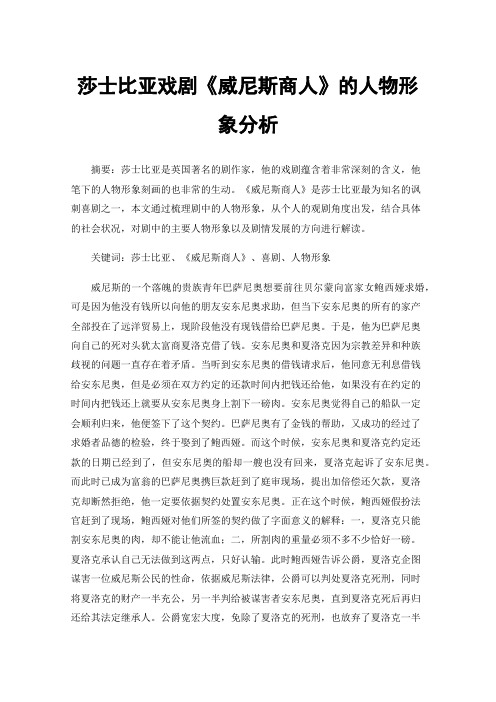
莎士比亚戏剧《威尼斯商人》的人物形象分析摘要:莎士比亚是英国著名的剧作家,他的戏剧蕴含着非常深刻的含义,他笔下的人物形象刻画的也非常的生动。
《威尼斯商人》是莎士比亚最为知名的讽刺喜剧之一,本文通过梳理剧中的人物形象,从个人的观剧角度出发,结合具体的社会状况,对剧中的主要人物形象以及剧情发展的方向进行解读。
关键词:莎士比亚、《威尼斯商人》、喜剧、人物形象威尼斯的一个落魄的贵族青年巴萨尼奥想要前往贝尔蒙向富家女鲍西娅求婚,可是因为他没有钱所以向他的朋友安东尼奥求助,但当下安东尼奥的所有的家产全部投在了远洋贸易上,现阶段他没有现钱借给巴萨尼奥。
于是,他为巴萨尼奥向自己的死对头犹太富商夏洛克借了钱。
安东尼奥和夏洛克因为宗教差异和种族歧视的问题一直存在着矛盾。
当听到安东尼奥的借钱请求后,他同意无利息借钱给安东尼奥,但是必须在双方约定的还款时间内把钱还给他,如果没有在约定的时间内把钱还上就要从安东尼奥身上割下一磅肉。
安东尼奥觉得自己的船队一定会顺利归来,他便签下了这个契约。
巴萨尼奥有了金钱的帮助,又成功的经过了求婚者品德的检验,终于娶到了鲍西娅。
而这个时候,安东尼奥和夏洛克约定还款的日期已经到了,但安东尼奥的船却一艘也没有回来,夏洛克起诉了安东尼奥。
而此时已成为富翁的巴萨尼奥携巨款赶到了庭审现场,提出加倍偿还欠款,夏洛克却断然拒绝,他一定要依据契约处置安东尼奥。
正在这个时候,鲍西娅假扮法官赶到了现场,鲍西娅对他们所签的契约做了字面意义的解释:一,夏洛克只能割安东尼奥的肉,却不能让他流血;二,所割肉的重量必须不多不少恰好一磅。
夏洛克承认自己无法做到这两点,只好认输。
此时鲍西娅告诉公爵,夏洛克企图谋害一位威尼斯公民的性命,依据威尼斯法律,公爵可以判处夏洛克死刑,同时将夏洛克的财产一半充公,另一半判给被谋害者安东尼奥,直到夏洛克死后再归还给其法定继承人。
公爵宽宏大度,免除了夏洛克的死刑,也放弃了夏洛克一半的财产,安东尼奥则表示,他愿意接收公爵的判决,条件是夏洛克必须皈依基督教。
《威尼斯商人》中人物形象的研究
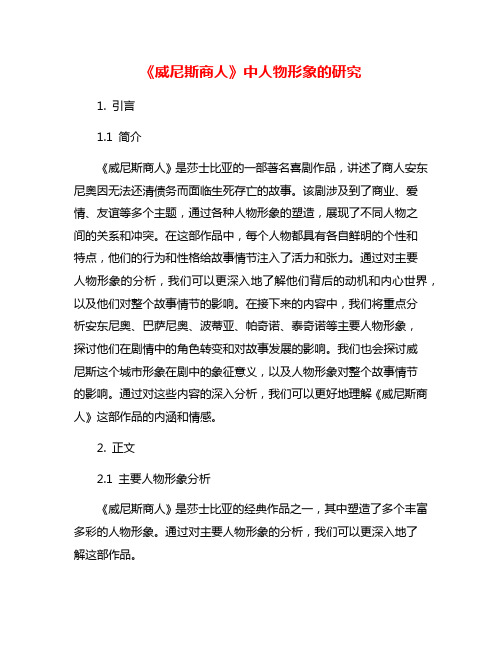
《威尼斯商人》中人物形象的研究1. 引言1.1 简介《威尼斯商人》是莎士比亚的一部著名喜剧作品,讲述了商人安东尼奥因无法还清债务而面临生死存亡的故事。
该剧涉及到了商业、爱情、友谊等多个主题,通过各种人物形象的塑造,展现了不同人物之间的关系和冲突。
在这部作品中,每个人物都具有各自鲜明的个性和特点,他们的行为和性格给故事情节注入了活力和张力。
通过对主要人物形象的分析,我们可以更深入地了解他们背后的动机和内心世界,以及他们对整个故事情节的影响。
在接下来的内容中,我们将重点分析安东尼奥、巴萨尼奥、波蒂亚、帕奇诺、泰奇诺等主要人物形象,探讨他们在剧情中的角色转变和对故事发展的影响。
我们也会探讨威尼斯这个城市形象在剧中的象征意义,以及人物形象对整个故事情节的影响。
通过对这些内容的深入分析,我们可以更好地理解《威尼斯商人》这部作品的内涵和情感。
2. 正文2.1 主要人物形象分析《威尼斯商人》是莎士比亚的经典作品之一,其中塑造了多个丰富多彩的人物形象。
通过对主要人物形象的分析,我们可以更深入地了解这部作品。
首先是安东尼奥。
安东尼奥是一位富有、慷慨和仁慈的商人,他借钱给了他的朋友巴萨尼奥,但最终却无法按时偿还债务,导致了剧中的冲突。
安东尼奥的形象体现了友谊、忠诚和信任的重要性。
接下来是巴萨尼奥。
巴萨尼奥是一位潇洒、聪明和狡猾的商人,他借钱给了安东尼奥,并使用了一种不同寻常的还款方式。
巴萨尼奥的形象展现了商人的机智和精明。
波蒂亚是一位聪明、狡诈和阴险的人物,他在剧中扮演着反派的角色。
波蒂亚的形象体现了欺诈、欲望和自私的本质。
帕奇诺和泰奇诺则是两位另类的人物形象,他们通过幽默和喜剧的元素为整个故事增添了一丝轻松的气氛。
这些主要人物形象的多样性和丰富性为整个故事的发展增添了色彩,呈现出了不同的性格特点和行为方式。
每个人物都在剧中扮演着重要的角色,推动着故事情节的发展,让观众对人性和友谊有着深刻的思考。
【内容结束】2.2 安东尼奥安东尼奥是《威尼斯商人》中的主要人物之一,他是一个富有的商人,具有高尚的品德和忠诚的性格。
《威尼斯商人》中人物形象的研究
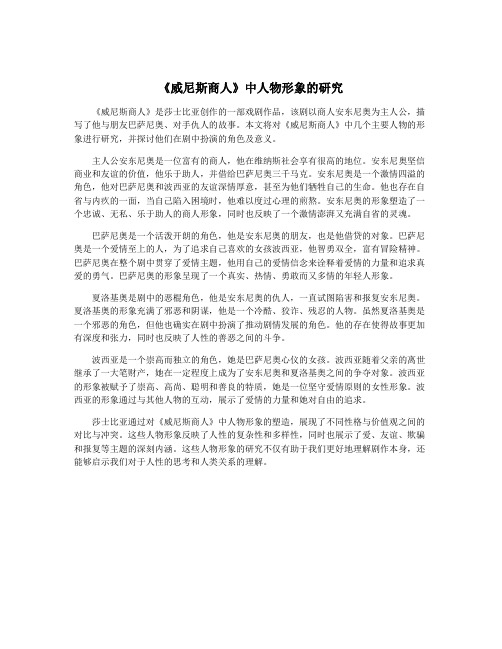
《威尼斯商人》中人物形象的研究《威尼斯商人》是莎士比亚创作的一部戏剧作品,该剧以商人安东尼奥为主人公,描写了他与朋友巴萨尼奥、对手仇人的故事。
本文将对《威尼斯商人》中几个主要人物的形象进行研究,并探讨他们在剧中扮演的角色及意义。
主人公安东尼奥是一位富有的商人,他在维纳斯社会享有很高的地位。
安东尼奥坚信商业和友谊的价值,他乐于助人,并借给巴萨尼奥三千马克。
安东尼奥是一个激情四溢的角色,他对巴萨尼奥和波西亚的友谊深情厚意,甚至为他们牺牲自己的生命。
他也存在自省与内疚的一面,当自己陷入困境时,他难以度过心理的煎熬。
安东尼奥的形象塑造了一个忠诚、无私、乐于助人的商人形象,同时也反映了一个激情澎湃又充满自省的灵魂。
巴萨尼奥是一个活泼开朗的角色,他是安东尼奥的朋友,也是他借贷的对象。
巴萨尼奥是一个爱情至上的人,为了追求自己喜欢的女孩波西亚,他智勇双全,富有冒险精神。
巴萨尼奥在整个剧中贯穿了爱情主题,他用自己的爱情信念来诠释着爱情的力量和追求真爱的勇气。
巴萨尼奥的形象呈现了一个真实、热情、勇敢而又多情的年轻人形象。
夏洛基奥是剧中的恶棍角色,他是安东尼奥的仇人,一直试图陷害和报复安东尼奥。
夏洛基奥的形象充满了邪恶和阴谋,他是一个冷酷、狡诈、残忍的人物。
虽然夏洛基奥是一个邪恶的角色,但他也确实在剧中扮演了推动剧情发展的角色。
他的存在使得故事更加有深度和张力,同时也反映了人性的善恶之间的斗争。
波西亚是一个崇高而独立的角色,她是巴萨尼奥心仪的女孩。
波西亚随着父亲的离世继承了一大笔财产,她在一定程度上成为了安东尼奥和夏洛基奥之间的争夺对象。
波西亚的形象被赋予了崇高、高尚、聪明和善良的特质,她是一位坚守爱情原则的女性形象。
波西亚的形象通过与其他人物的互动,展示了爱情的力量和她对自由的追求。
莎士比亚通过对《威尼斯商人》中人物形象的塑造,展现了不同性格与价值观之间的对比与冲突。
这些人物形象反映了人性的复杂性和多样性,同时也展示了爱、友谊、欺骗和报复等主题的深刻内涵。
威尼斯商人主要人物分析
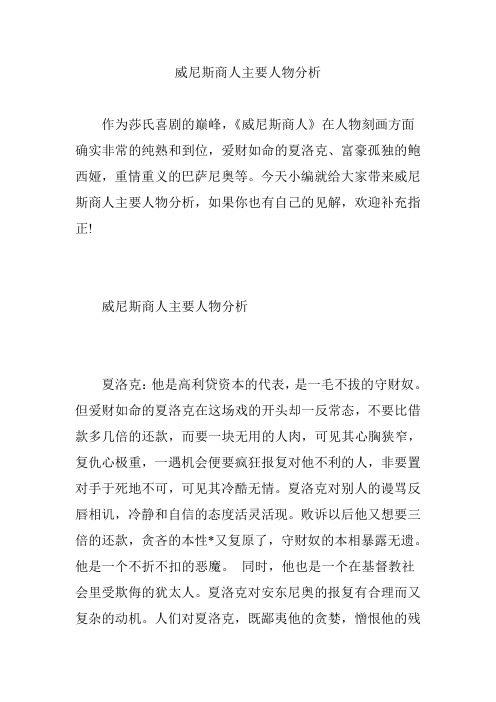
威尼斯商人主要人物分析作为莎氏喜剧的巅峰,《威尼斯商人》在人物刻画方面确实非常的纯熟和到位,爱财如命的夏洛克、富豪孤独的鲍西娅,重情重义的巴萨尼奥等。
今天小编就给大家带来威尼斯商人主要人物分析,如果你也有自己的见解,欢迎补充指正!威尼斯商人主要人物分析夏洛克:他是高利贷资本的代表,是一毛不拔的守财奴。
但爱财如命的夏洛克在这场戏的开头却一反常态,不要比借款多几倍的还款,而要一块无用的人肉,可见其心胸狭窄,复仇心极重,一遇机会便要疯狂报复对他不利的人,非要置对手于死地不可,可见其冷酷无情。
夏洛克对别人的谩骂反唇相讥,冷静和自信的态度活灵活现。
败诉以后他又想要三倍的还款,贪吝的本性*又复原了,守财奴的本相暴露无遗。
他是一个不折不扣的恶魔。
同时,他也是一个在基督教社会里受欺侮的犹太人。
夏洛克对安东尼奥的报复有合理而又复杂的动机。
人们对夏洛克,既鄙夷他的贪婪,憎恨他的残酷,又多少同情他所受的种族压迫和屈辱。
在很多人的眼里夏洛克是一个贪得无厌、一毛不拔、吸血鬼的形象,又是一个守财奴“让一个靠不住的奴才看守着门户,有点放心不下”,夏洛克不能说不是这部喜剧中的悲剧人物,仆人饿跑了投奔了自己嫉恨的人,而女儿更是抱着自己的财产和情人私奔了,最后甚至是输掉了自己的剩余的一部分财产,他可真是“赔了夫人又折兵”。
更是一个报复心极强的人,为了报复安东尼奥的辱骂之仇可以不收利息让他一步一步地钻入圈套里,为了就是要得到他的一块肉,可是他得到肉又能怎样?他却说“拿来钓鱼也好”。
其实安东尼奥也是挡住他财路的一个拦路虎,为了自己的财路必须要把这个拦路虎除掉。
鲍西娅:这是作者极力歌颂的人文主义者的形象。
她是一个富豪贵族的孤女。
她是个有学问,有修养的新时代的女性*,她的谈吐文雅,又机智勇敢,她为了援助丈夫的朋友,女扮男装,作为出庭的法律顾问,判决夏洛克的案件,有胆有识,既维护了法律的尊严,又置恶人于死地,大快人心。
可以说,鲍西娅是一个新时代女性*形象,是活泼、开朗、大方、幽默并且充满智慧的人,她在选偶的时候为了自己心爱的人,不惜做手脚,而当她面对咄咄逼人的夏洛克的时候,是从容不迫,一步步让对手落入自己的圈套中。
《威尼斯商人》中夏洛克的人物分析

《威尼斯商人》中夏洛克的人物分析一、作品的社会背景《威尼斯商人》是莎士比亚的杰出喜剧作品之一。
作品当中的人物夏洛克是莎士比亚塑造的成功反面形象之一,造成夏洛克这种复杂性格的原因很多,主要原因是社会和历史背景。
透视过社会深层背景这一面纱,我们会了解夏洛克其实是社会的牺牲品。
中世纪的欧洲基督教一统天下,犹太人被视为是上帝唾弃的民族,他们没有自己的国家和土地,被迫在世界各地游走做生意为生。
只能靠自己的勤劳聪明努力生存和生活。
即使这样,他们还是会随时遭到基督教及当时社会普通人的歧视和侮辱。
当时的威尼斯虽说是讲法律的社会,人民大众对法律也是深信不疑,夏洛克也曾多次运用法律武器来维护自己的正当权益,以及复仇基督教徒,但是一再受到打击,他的这点力量在基督教徒面前可谓太微不足道了,仍然受到歧视和压迫。
多少人在不了解社会背景的情况下来蔑视夏洛克的,因此在评价人之前了解下社会背景是非常必要的。
二、对夏洛克的人性剖析1.夏洛克是残忍的贪婪的高利贷者的典型代表。
在小说中,夏洛克没有要求安东尼奥偿还几倍的钱而是要割掉他身上的一磅肉,从这里我们可以看出夏洛克有着强烈的复仇意识,这就意味着一旦有任何机会夏洛克都不会放过,不会放过那些鄙视他侮辱他的人。
他一步一步让安东尼奥走入他的设计中,最后不得不割掉身上的一磅肉,除了那块没有用处的肉,夏洛克能得到什么呢?夏洛克在剧中有这么句话:“他曾经侮辱过我,夺取我十几万的生意,讥笑我的亏蚀,挖苦着我的盈余,侮辱我的民族,破坏我的买卖,离间我的朋友,煽动我的仇敌,他们的理由是什么?只因为我是个犹太人,犹太人没有眼睛吗?难道犹太人没有五官四肢、没有知觉、没有感情、没有血气吗?他不是吃着同样的食物,同样的武器可以伤害他,同样的医药可以治疗他,冬天同样会冷,夏天同样会热,就像一个基督教一样吗?那么你们要是欺侮了我们,我们难道不会复仇吗?要是在别的地方我们都跟你们一样,那么在这一点上也是彼此相同的。
《威尼斯商人》人物分析和女性主义解读
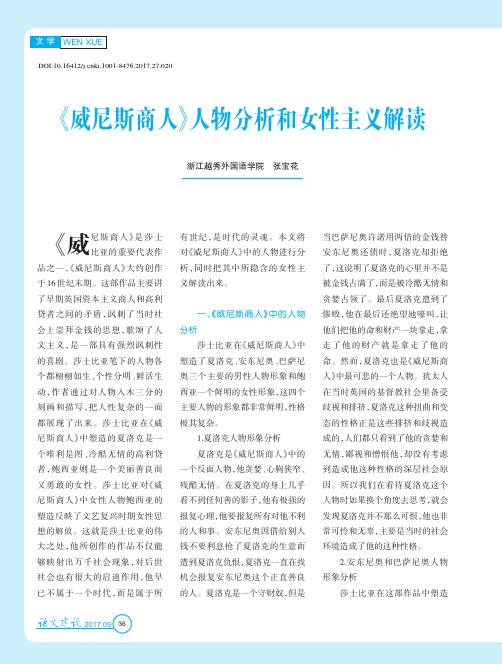
文学WENXUE 2017.09《威尼斯商人》是莎士比亚的重要代表作品之一,《威尼斯商人》大约创作于16世纪末期。
这部作品主要讲了早期英国资本主义商人和高利贷者之间的矛盾,讽刺了当时社会上崇拜金钱的思想,歌颂了人文主义,是一部具有强烈讽刺性的喜剧。
莎士比亚笔下的人物各个都栩栩如生、个性分明、鲜活生动,作者通过对人物入木三分的刻画和描写,把人性复杂的一面都展现了出来。
莎士比亚在《威尼斯商人》中塑造的夏洛克是一个唯利是图、冷酷无情的高利贷者,鲍西亚则是一个美丽善良而又勇敢的女性。
莎士比亚对《威尼斯商人》中女性人物鲍西亚的塑造反映了文艺复兴时期女性思想的解放。
这就是莎士比亚的伟大之处,他所创作的作品不仅能够映射出万千社会现象,对后世社会也有很大的启迪作用,他早已不属于一个时代,而是属于所有世纪,是时代的灵魂。
本文将对《威尼斯商人》中的人物进行分析,同时把其中所隐含的女性主义解读出来。
一、《威尼斯商人》中的人物分析莎士比亚在《威尼斯商人》中塑造了夏洛克、安东尼奥、巴萨尼奥三个主要的男性人物形象和鲍西亚一个鲜明的女性形象,这四个主要人物的形象都非常鲜明,性格极其复杂。
1.夏洛克人物形象分析夏洛克是《威尼斯商人》中的一个反面人物,他贪婪、心胸狭窄、残酷无情。
在夏洛克的身上几乎看不到任何善的影子,他有极强的报复心理,他要报复所有对他不利的人和事。
安东尼奥因借给别人钱不要利息抢了夏洛克的生意而遭到夏洛克仇恨,夏洛克一直在找机会报复安东尼奥这个正直善良的人。
夏洛克是一个守财奴,但是当巴萨尼奥许诺用两倍的金钱替安东尼奥还债时,夏洛克却拒绝了,这说明了夏洛克的心里并不是被金钱占满了,而是被冷酷无情和贪婪占领了。
最后夏洛克遭到了惨败,他在最后还绝望地嚎叫,让他们把他的命和财产一块拿走,拿走了他的财产就是拿走了他的命。
然而,夏洛克也是《威尼斯商人》中最可悲的一个人物。
犹太人在当时英国的基督教社会里备受歧视和排挤,夏洛克这种扭曲和变态的性格正是这些排挤和歧视造成的,人们都只看到了他的贪婪和无情,鄙视和憎恨他,却没有考虑到造成他这种性格的深层社会原因。
《威尼斯商人》中人物形象的研究

《威尼斯商人》中人物形象的研究《威尼斯商人》是莎士比亚的一部著名剧作,通过描写商人安东尼奥、朱丽叶、鲍西娅、夏洛克、拉契尔等人物形象,展示了人性的黑暗面和商业世界的残酷竞争。
商人安东尼奥是本剧的主角,他是一位纯朴、慷慨、宽容的商人,但他因对巴萨尼奥的借贷而面临巨大的风险,甚至将自己的生命抵押出去,这表明他的商人身份与他的善良品格之间存在着矛盾。
另一方面,暴力狂魔夏洛克则是个伪君子,在表面上看,他是一位为了维护法律和秩序而存在的官员,但实际上,他的手段卑劣、不择手段,甚至利用自己的权力打击个人的利益。
相形之下,安东尼奥更显得纯粹高尚。
另一个重要人物鲍西娅则是一位智慧且独立的女性,她不顾身份的局限,以自己的能力和判断力领导着男性。
但是她对于巴萨尼奥的死一度有所怀疑,在当时的观众看来,这种心理几乎是不可想象的,因为女性在那个时代处于车轮战和家庭管理的角色中,而不是在社会和政治事务中发挥重要作用。
摩洛可则是一个富有的绅士,他在帮助安东尼奥的同时,也展现了自己的商业智慧,这使他成为本剧中最成功的人物之一。
相反,巴萨尼奥是一个虚荣而贪财的人,他为了钱可以出卖自己的女儿,从而使他的一切都引人注目。
最后一个重要的角色是朱丽叶,她是巴萨尼奥的女儿,她对于商业世界和政治局势了解得很少,只是一位纯真、天真的女孩,被自己的父亲囚禁和要求嫁给一个富有的主角。
她的出现和她走向的一个无法逆转的结局,使她成为了本剧中备受注意的一位角色。
总之,《威尼斯商人》的人物形象显现出的是人性中黑暗、贪婪、狂热的部分,这与当时商业社会的残酷竞争、经济普遍萧条、社会地位的等级分化有着密切的联系。
莎士比亚通过本剧,向观众展现了人性的复杂性、商业世界的残酷竞争,从而提醒观众如何应对自己内心的追求和世俗的视线。
人物性格与命运《威尼斯商人》的角色分析
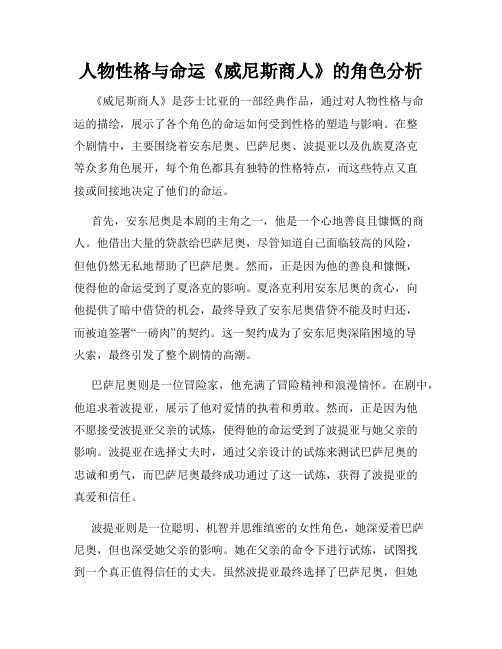
人物性格与命运《威尼斯商人》的角色分析《威尼斯商人》是莎士比亚的一部经典作品,通过对人物性格与命运的描绘,展示了各个角色的命运如何受到性格的塑造与影响。
在整个剧情中,主要围绕着安东尼奥、巴萨尼奥、波提亚以及仇族夏洛克等众多角色展开,每个角色都具有独特的性格特点,而这些特点又直接或间接地决定了他们的命运。
首先,安东尼奥是本剧的主角之一,他是一个心地善良且慷慨的商人。
他借出大量的贷款给巴萨尼奥,尽管知道自己面临较高的风险,但他仍然无私地帮助了巴萨尼奥。
然而,正是因为他的善良和慷慨,使得他的命运受到了夏洛克的影响。
夏洛克利用安东尼奥的贪心,向他提供了暗中借贷的机会,最终导致了安东尼奥借贷不能及时归还,而被迫签署“一磅肉”的契约。
这一契约成为了安东尼奥深陷困境的导火索,最终引发了整个剧情的高潮。
巴萨尼奥则是一位冒险家,他充满了冒险精神和浪漫情怀。
在剧中,他追求着波提亚,展示了他对爱情的执着和勇敢。
然而,正是因为他不愿接受波提亚父亲的试炼,使得他的命运受到了波提亚与她父亲的影响。
波提亚在选择丈夫时,通过父亲设计的试炼来测试巴萨尼奥的忠诚和勇气,而巴萨尼奥最终成功通过了这一试炼,获得了波提亚的真爱和信任。
波提亚则是一位聪明、机智并思维缜密的女性角色,她深爱着巴萨尼奥,但也深受她父亲的影响。
她在父亲的命令下进行试炼,试图找到一个真正值得信任的丈夫。
虽然波提亚最终选择了巴萨尼奥,但她也为此付出了代价,因为她的行动间接导致了她父亲和安东尼奥之间的冲突,甚至使得安东尼奥陷入生死存亡的境地。
仇族夏洛克是本剧中的反派角色,他以狡诈、狠毒和复仇心态为特点。
他在剧中一直暗中策划,旨在通过陷害安东尼奥,达到对整个威尼斯商人的复仇之心。
夏洛克的命运受到他自己的性格和行动的直接影响,他的复仇计划在最后被法律制裁,最终导致了他自己的悲剧结局。
总体而言,《威尼斯商人》中的人物性格与命运是紧密相连的。
每个角色的性格决定了他们在剧情中的选择和行为,而这些选择和行为又进一步塑造了他们的命运。
《威尼斯商人》中人物的悲剧性分析
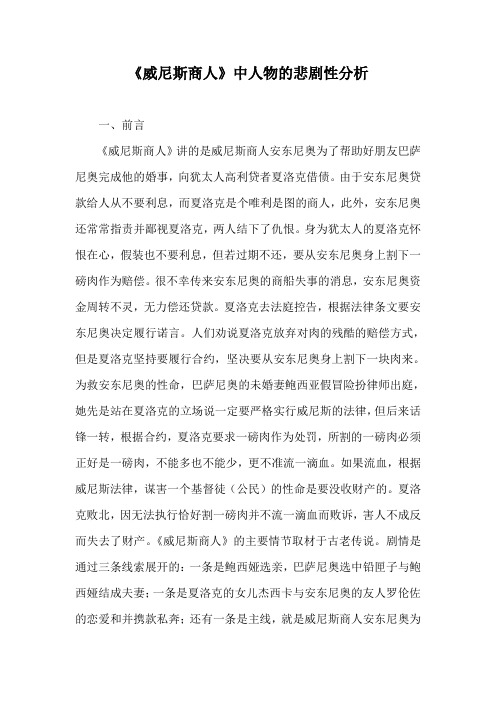
《威尼斯商人》中人物的悲剧性分析一、前言《威尼斯商人》讲的是威尼斯商人安东尼奥为了帮助好朋友巴萨尼奥完成他的婚事,向犹太人高利贷者夏洛克借债。
由于安东尼奥贷款给人从不要利息,而夏洛克是个唯利是图的商人,此外,安东尼奥还常常指责并鄙视夏洛克,两人结下了仇恨。
身为犹太人的夏洛克怀恨在心,假装也不要利息,但若过期不还,要从安东尼奥身上割下一磅肉作为赔偿。
很不幸传来安东尼奥的商船失事的消息,安东尼奥资金周转不灵,无力偿还贷款。
夏洛克去法庭控告,根据法律条文要安东尼奥决定履行诺言。
人们劝说夏洛克放弃对肉的残酷的赔偿方式,但是夏洛克坚持要履行合约,坚决要从安东尼奥身上割下一块肉来。
为救安东尼奥的性命,巴萨尼奥的未婚妻鲍西亚假冒险扮律师出庭,她先是站在夏洛克的立场说一定要严格实行威尼斯的法律,但后来话锋一转,根据合约,夏洛克要求一磅肉作为处罚,所割的一磅肉必须正好是一磅肉,不能多也不能少,更不准流一滴血。
如果流血,根据威尼斯法律,谋害一个基督徒(公民)的性命是要没收财产的。
夏洛克败北,因无法执行恰好割一磅肉并不流一滴血而败诉,害人不成反而失去了财产。
《威尼斯商人》的主要情节取材于古老传说。
剧情是通过三条线索展开的:一条是鲍西娅选亲,巴萨尼奥选中铅匣子与鲍西娅结成夫妻;一条是夏洛克的女儿杰西卡与安东尼奥的友人罗伦佐的恋爱和并携款私奔;还有一条是主线,就是威尼斯商人安东尼奥为了成全巴萨尼奥的婚姻,向高利贷者犹太人夏洛克借款三千金币如无法偿还以肉抵债而引起的契约纠纷。
《威尼斯商人》是莎士比亚早期的重要作品,是一部具有极大讽刺性的喜剧。
大约写作于1596~1597年。
此剧被反复翻译成汉语,并多次被选入课本。
剧本的主题是歌颂仁爱、友谊和爱情,同时也反映了资本主义早期商业资产阶级与高利贷者之间的矛盾,表现了作者对资产阶级社会中金钱、法律和宗教等问题的人文主义思想。
这部剧作的一个重要文学成就,就是塑造了夏洛克这一唯利是图、冷酷无情的高利贷者的典型形象。
威尼斯商人中的夏洛克人物形象分析
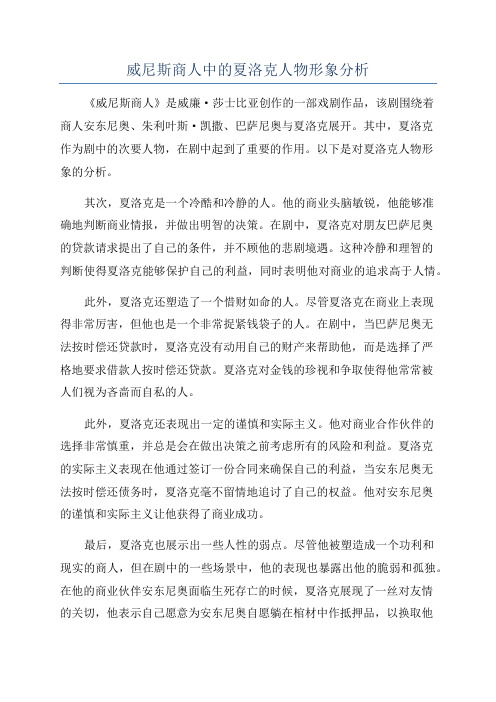
威尼斯商人中的夏洛克人物形象分析《威尼斯商人》是威廉·莎士比亚创作的一部戏剧作品,该剧围绕着商人安东尼奥、朱利叶斯·凯撒、巴萨尼奥与夏洛克展开。
其中,夏洛克作为剧中的次要人物,在剧中起到了重要的作用。
以下是对夏洛克人物形象的分析。
其次,夏洛克是一个冷酷和冷静的人。
他的商业头脑敏锐,他能够准确地判断商业情报,并做出明智的决策。
在剧中,夏洛克对朋友巴萨尼奥的贷款请求提出了自己的条件,并不顾他的悲剧境遇。
这种冷静和理智的判断使得夏洛克能够保护自己的利益,同时表明他对商业的追求高于人情。
此外,夏洛克还塑造了一个惜财如命的人。
尽管夏洛克在商业上表现得非常厉害,但他也是一个非常捉紧钱袋子的人。
在剧中,当巴萨尼奥无法按时偿还贷款时,夏洛克没有动用自己的财产来帮助他,而是选择了严格地要求借款人按时偿还贷款。
夏洛克对金钱的珍视和争取使得他常常被人们视为吝啬而自私的人。
此外,夏洛克还表现出一定的谨慎和实际主义。
他对商业合作伙伴的选择非常慎重,并总是会在做出决策之前考虑所有的风险和利益。
夏洛克的实际主义表现在他通过签订一份合同来确保自己的利益,当安东尼奥无法按时偿还债务时,夏洛克毫不留情地追讨了自己的权益。
他对安东尼奥的谨慎和实际主义让他获得了商业成功。
最后,夏洛克也展示出一些人性的弱点。
尽管他被塑造成一个功利和现实的商人,但在剧中的一些场景中,他的表现也暴露出他的脆弱和孤独。
在他的商业伙伴安东尼奥面临生死存亡的时候,夏洛克展现了一丝对友情的关切,他表示自己愿意为安东尼奥自愿躺在棺材中作抵押品,以换取他的生命。
这一场景表明夏洛克虽然追求金钱和自己的利益,但他的内心深处也存在着一种人性的情感。
综上所述,夏洛克在《威尼斯商人》中是一个重要且多维的人物。
他作为一个成功而富有的商人,展现了商业头脑的敏锐和冷静。
他的财富和实际主义给他带来了商业上的成功,但他的吝啬和自私也让他被视为不够仁慈。
然而,夏洛克的形象也展现了他脆弱和孤独的一面,这使得他不仅仅是一个冷酷无情的商人形象。
《威尼斯商人》人物评析-生活类
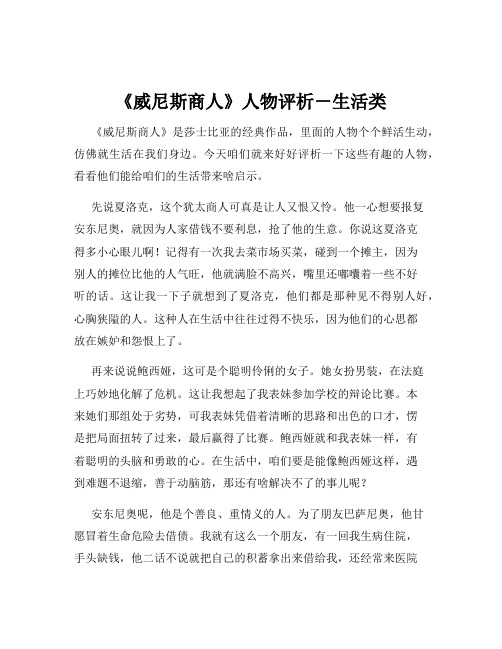
《威尼斯商人》人物评析-生活类《威尼斯商人》是莎士比亚的经典作品,里面的人物个个鲜活生动,仿佛就生活在我们身边。
今天咱们就来好好评析一下这些有趣的人物,看看他们能给咱们的生活带来啥启示。
先说夏洛克,这个犹太商人可真是让人又恨又怜。
他一心想要报复安东尼奥,就因为人家借钱不要利息,抢了他的生意。
你说这夏洛克得多小心眼儿啊!记得有一次我去菜市场买菜,碰到一个摊主,因为别人的摊位比他的人气旺,他就满脸不高兴,嘴里还嘟囔着一些不好听的话。
这让我一下子就想到了夏洛克,他们都是那种见不得别人好,心胸狭隘的人。
这种人在生活中往往过得不快乐,因为他们的心思都放在嫉妒和怨恨上了。
再来说说鲍西娅,这可是个聪明伶俐的女子。
她女扮男装,在法庭上巧妙地化解了危机。
这让我想起了我表妹参加学校的辩论比赛。
本来她们那组处于劣势,可我表妹凭借着清晰的思路和出色的口才,愣是把局面扭转了过来,最后赢得了比赛。
鲍西娅就和我表妹一样,有着聪明的头脑和勇敢的心。
在生活中,咱们要是能像鲍西娅这样,遇到难题不退缩,善于动脑筋,那还有啥解决不了的事儿呢?安东尼奥呢,他是个善良、重情义的人。
为了朋友巴萨尼奥,他甘愿冒着生命危险去借债。
我就有这么一个朋友,有一回我生病住院,手头缺钱,他二话不说就把自己的积蓄拿出来借给我,还经常来医院照顾我。
安东尼奥的这种真诚和义气,在生活中太珍贵了。
要是人人都能像他这样对待朋友,那这世界得多温暖啊!巴萨尼奥,一开始感觉他有点不靠谱,为了追求爱情盲目借债。
不过后来他也认识到了自己的错误,变得成熟起来。
这就像我邻居家的一个小哥哥,刚开始工作的时候,花钱大手大脚,没个规划。
后来经历了一些挫折,才知道要勤俭节约,认真规划自己的未来。
巴萨尼奥的经历告诉我们,人都会犯错,但重要的是能及时醒悟,改正错误。
还有杰西卡,为了爱情勇敢地逃离了父亲的束缚。
这让我想起了我的一个同学,她家里人不同意她和男朋友在一起,可她就是坚持自己的选择,最后也收获了幸福。
《威尼斯商人》中的人物形象分析
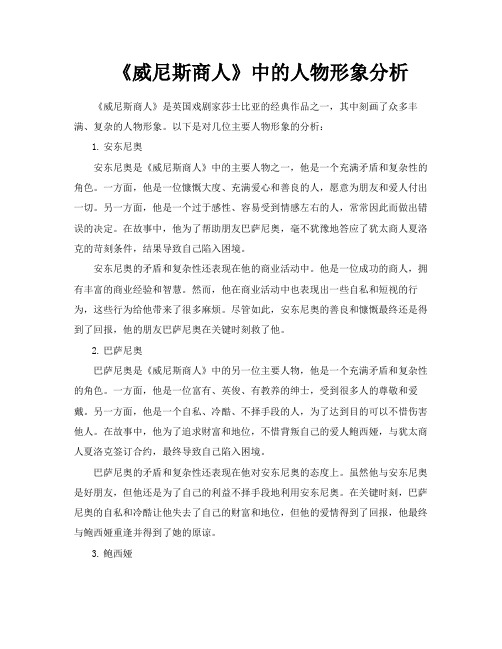
《威尼斯商人》中的人物形象分析《威尼斯商人》是英国戏剧家莎士比亚的经典作品之一,其中刻画了众多丰满、复杂的人物形象。
以下是对几位主要人物形象的分析:1.安东尼奥安东尼奥是《威尼斯商人》中的主要人物之一,他是一个充满矛盾和复杂性的角色。
一方面,他是一位慷慨大度、充满爱心和善良的人,愿意为朋友和爱人付出一切。
另一方面,他是一个过于感性、容易受到情感左右的人,常常因此而做出错误的决定。
在故事中,他为了帮助朋友巴萨尼奥,毫不犹豫地答应了犹太商人夏洛克的苛刻条件,结果导致自己陷入困境。
安东尼奥的矛盾和复杂性还表现在他的商业活动中。
他是一位成功的商人,拥有丰富的商业经验和智慧。
然而,他在商业活动中也表现出一些自私和短视的行为,这些行为给他带来了很多麻烦。
尽管如此,安东尼奥的善良和慷慨最终还是得到了回报,他的朋友巴萨尼奥在关键时刻救了他。
2.巴萨尼奥巴萨尼奥是《威尼斯商人》中的另一位主要人物,他是一个充满矛盾和复杂性的角色。
一方面,他是一位富有、英俊、有教养的绅士,受到很多人的尊敬和爱戴。
另一方面,他是一个自私、冷酷、不择手段的人,为了达到目的可以不惜伤害他人。
在故事中,他为了追求财富和地位,不惜背叛自己的爱人鲍西娅,与犹太商人夏洛克签订合约,最终导致自己陷入困境。
巴萨尼奥的矛盾和复杂性还表现在他对安东尼奥的态度上。
虽然他与安东尼奥是好朋友,但他还是为了自己的利益不择手段地利用安东尼奥。
在关键时刻,巴萨尼奥的自私和冷酷让他失去了自己的财富和地位,但他的爱情得到了回报,他最终与鲍西娅重逢并得到了她的原谅。
3.鲍西娅鲍西娅是《威尼斯商人》中的女主角,她是一个美丽、聪明、独立自主的女性。
她拥有着强烈的个性和自我意识,敢于追求自己的梦想和幸福。
在故事中,鲍西娅是一位富有的女继承人,但她并不满足于被动地接受命运安排的角色,而是主动追求自己的幸福。
她拒绝了众多求婚者,直到她遇到了穷贵族安东尼奥。
鲍西娅与安东尼奥相爱并结婚,但她却因此失去了自己的财产和地位。
《威尼斯商人》中人物形象的研究
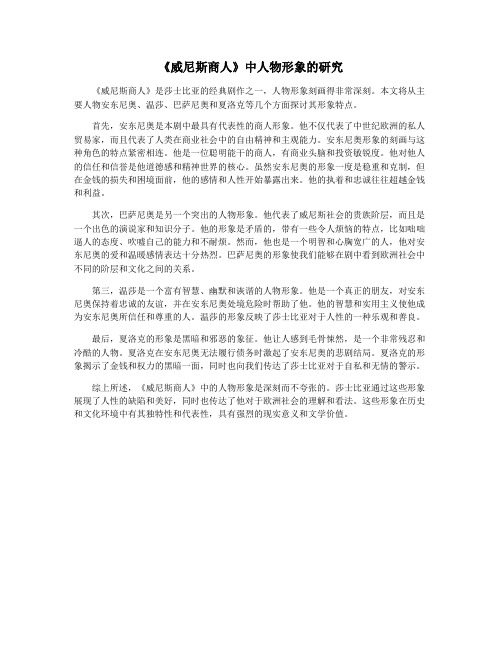
《威尼斯商人》中人物形象的研究《威尼斯商人》是莎士比亚的经典剧作之一,人物形象刻画得非常深刻。
本文将从主要人物安东尼奥、温莎、巴萨尼奥和夏洛克等几个方面探讨其形象特点。
首先,安东尼奥是本剧中最具有代表性的商人形象。
他不仅代表了中世纪欧洲的私人贸易家,而且代表了人类在商业社会中的自由精神和主观能力。
安东尼奥形象的刻画与这种角色的特点紧密相连。
他是一位聪明能干的商人,有商业头脑和投资敏锐度。
他对他人的信任和信誉是他道德感和精神世界的核心。
虽然安东尼奥的形象一度是稳重和克制,但在金钱的损失和困境面前,他的感情和人性开始暴露出来。
他的执着和忠诚往往超越金钱和利益。
其次,巴萨尼奥是另一个突出的人物形象。
他代表了威尼斯社会的贵族阶层,而且是一个出色的演说家和知识分子。
他的形象是矛盾的,带有一些令人烦恼的特点,比如咄咄逼人的态度、吹嘘自己的能力和不耐烦。
然而,他也是一个明智和心胸宽广的人,他对安东尼奥的爱和温暖感情表达十分热烈。
巴萨尼奥的形象使我们能够在剧中看到欧洲社会中不同的阶层和文化之间的关系。
第三,温莎是一个富有智慧、幽默和诙谐的人物形象。
他是一个真正的朋友,对安东尼奥保持着忠诚的友谊,并在安东尼奥处境危险时帮助了他。
他的智慧和实用主义使他成为安东尼奥所信任和尊重的人。
温莎的形象反映了莎士比亚对于人性的一种乐观和善良。
最后,夏洛克的形象是黑暗和邪恶的象征。
他让人感到毛骨悚然,是一个非常残忍和冷酷的人物。
夏洛克在安东尼奥无法履行债务时激起了安东尼奥的悲剧结局。
夏洛克的形象揭示了金钱和权力的黑暗一面,同时也向我们传达了莎士比亚对于自私和无情的警示。
综上所述,《威尼斯商人》中的人物形象是深刻而不夸张的。
莎士比亚通过这些形象展现了人性的缺陷和美好,同时也传达了他对于欧洲社会的理解和看法。
这些形象在历史和文化环境中有其独特性和代表性,具有强烈的现实意义和文学价值。
- 1、下载文档前请自行甄别文档内容的完整性,平台不提供额外的编辑、内容补充、找答案等附加服务。
- 2、"仅部分预览"的文档,不可在线预览部分如存在完整性等问题,可反馈申请退款(可完整预览的文档不适用该条件!)。
- 3、如文档侵犯您的权益,请联系客服反馈,我们会尽快为您处理(人工客服工作时间:9:00-18:30)。
《威尼斯商人》中的人物分析
作者:李贺
来源:《神州·下旬刊》2019年第08期
摘要:莎士比亚被尊称为人类艺术工程师,其作品带有丰富的现实主义精神,所描绘出的情节生动有趣,其众多作品被翻译成世界各种文字流传于世,《威尼斯商人》是莎士比亚于1596年,结合当时的社会背景所创造出的喜剧作品,在剧中成功的塑造出了众多具有个性的人物形象。
除了曲折的故事情节和一些优美、充满人生智慧的语言之外,让守财奴夏洛克、具有人文主义精神的鲍西娅、资产阶级商人安东尼奥等形象生动地展示在我们面前,本文主要对《威尼斯商人》中的人物形象进行了分析,并且探讨了鲍西娅这一人物形象的不同解读。
关键词:《威尼斯商人》;人物分析
在进行《威尼斯商人》解读的过程中,我们可以将整个剧本分为大致三个内容,首先是,鲍西娅与巴萨尼奥之间的恋爱故事,其次是夏洛克和安东尼奥之间的金钱纠纷,还有一条隐线是夏洛克的女儿与基督教徒私奔,第三条线索并没有仔细地谈论,其中最扣人心悬的部分,就是夏洛克与安东尼奥之间的矛盾,我们在进行人物分析的过程中,鲍西娅和巴塞尼奥爱情故事可以作为鲍西娅角色分析的主要线索,与夏洛克和安东尼奥之间的矛盾纠纷互相交织铺垫,故事的结局是鲍西娅运用智慧在法庭上成功反转,令夏洛克不但不能实施自己的报复、同时还因为再三不接受鲍西娅给出的条件而导致最后自己的更大损失。
全剧以鲍西娅和巴萨尼奥、安东尼奥等人的大团圆式喜剧结尾,弱化了损失更多的犹太放贷者夏洛克在这场戏中悲剧命运。
在此我们对夏洛克、安东尼奥、鲍西娅和巴萨尼奥进行详细的人物分析。
一、《威尼斯商人》中的人物分析
1、安东尼奥的人物形象分析。
从《威尼斯商人》的整体剧情看,安东尼奥是正面人物,其与夏洛克之间所造成的矛盾和利益关系,成为了贯穿于整部剧的主线,安东尼奥是当时所处的资产阶级社会环境中阶级商人的典型代表,其接受过良好的社会教育,并且有着较多的社会财产,在当时的社会背景下,具有较高的社会地位,并且珍视友谊,胸襟宽广。
为了帮助巴萨尼奥追求鲍西娅,安东尼奥多次的借钱给巴萨尼奥,但由于巴萨尼奥生活拮据始终没有还款给安东尼奥,安东尼奥十分珍视其与巴萨尼奥之间的友谊,提出只要在自己能力所及的范围内,就一定会全力支持巴萨尼奥去追求鲍西娅,从这一剧情发展情况来看,我们可以得知安东尼奥是一个极其重视友情,并且能够在危急时刻帮助友人的性格。
正是受这一个性格发展的影响,使其不得不为了帮助朋友而向高利贷商人夏洛克借款。
安东尼奥一直对像夏洛克这样靠放贷挣取利益的人非常鄙视,即使在面对夏洛克的威胁时,内心依旧十分坚定。
莎士比亚成功的塑造出了一个具有典型时代特征的资产阶级商人,虽然本质有些懦弱,但是却很看重朋友之间的友谊,认为金钱是可有可无的东西,其以宽厚仁爱的优秀道德品质,受到了大多数读者的广泛认可。
2、鲍西娅的人物形象分析。
首先我们可以得知鲍西娅的人物塑造属于贵族小姐,之所以要赋予鲍西娅一个正面人物的身份,是为了充分的体现出人文主义发展精神,鲍西娅在整部剧中的表现,积极的争取婚姻自由,她有着聪明的头脑,美丽的外表,温柔的性格,善良的灵魂,言语之间透露着幽默机智,她敢于反抗当时的社会条件制约,积极去争取自己的婚姻自由。
虽然仍听取了父亲的安排,在三个盒子中分别放入画像,这种婚姻方式,毫无疑问与鲍西娅追求爱情的權利之间产生了矛盾,但鲍西娅用自己的聪明和才智,与侍女一起引来了很多自己不欣赏的追求者。
结合剧情,我们可以得知巴萨尼奥的经济条件与鲍西娅之间具有一定的差距,但是鲍西娅仍然选择了自己挚爱的巴萨尼奥,当得知巴萨尼奥的朋友安东尼奥遭受到困难时,鲍西娅义无反顾的挺身而出,在众人面前,通过法律的正义击败了夏洛克,这一幕不仅体现出了鲍西娅所具有的机智、勇敢特性,并且解救了置身于困境之中的安东尼奥。
3、巴萨尼奥的人物形象分析。
《威尼斯商人》中巴萨尼奥给人印象最为深刻的就是巴萨尼奥是鲍西娅的求婚者,在整部剧情的发展过程中,巴萨尼奥和鲍西娅之间的爱情故事是重要的线索,同时也正是由于巴萨尼奥要借钱才有机会选匣赢取鲍西娅,才有了安东尼奥不得不向自己鄙视的夏洛克借钱、一步步推进了彼此之间的矛盾和仇恨。
巴萨尼奥敢于追求爱情的精神,受到了读者和观众的广泛肯定,并且在得知自己的好朋友安东尼奥遭遇险境时,他也在积极地帮助安东尼奥,我们可以从鲍西娅与巴萨尼奥之间的互动得知,巴萨尼奥是一个具有优秀言谈举止的上流阶级贵族,这也是他能够获得鲍西娅垂青的主要因素。
4、夏洛克的人物形象分析。
夏洛克是《威尼斯商人》中贪婪、吝啬、而且冷酷无情的代表,具有极强的报复心理,在向安东尼奥进行借款时,主动提出了自己的主要目的是为了将安东尼奥置之于死地。
但是在法官面前夏洛克并没有出现一丝的慌乱,即使形势处于被动时,仍然展现出冷静自信,甚至想要向上追溯三倍的赔偿,夏洛克本身形象就十分热爱金钱,通过不法放贷换取高额的经济收益,这一形象与视金钱如粪土的安东尼奥形成了强烈的对比,安东尼奥在予人钱财时从不收取利息,从这一角度看,安东尼奥阻断了夏洛克的财路,因此夏洛克对安东尼奥剧有怀恨心理,莎士比亚将夏洛克塑造为一个刻薄、冷酷、心胸狭窄、贪婪吝啬的小人形象。
二、鲍西娅角色分析的争议性
我们在进行莎士比亚戏剧《威尼斯商人》中鲍西娅形象分析的过程中,可以得出结论,鲍西娅是该剧中最完美的人物形象,不仅拥有漂亮的容颜,出众的才华还是当时人文主义时代下最为理想的女性形象,通过自身的才智展现出了女性平等主义的特立独行,在这样一种前提下,有一种解读是:她并没有完全的觉醒,仍然接受了父权社会强加的思想观念。
没有认识到自己的命运被男性所掌控,也没有能力去完全改变这一现状。
这一发展原因也许是由于当时所处的社会环境,以及莎士比亚思想所具有的局限性。
我们在折服于鲍西娅美丽外表和多情才智的同时,还需要感慨在男权社会下,所导致的不完美命运。
在剧情中可以得知,美丽的鲍西娅喜欢上了巴萨尼奥,但是根据父亲临终前的遗言,两人想要在一起,就需要在三个盒子中选出装有鲍西娅画像的一个,如果选错两人将永远不能相见,而鲍西娅也选择遵循父亲的遗愿,没有告诉巴萨尼奥正确的答案,从中我们可以看出,鲍西娅受到父权主义的影响,并没有完全脱
离父亲的掌控。
另一方面,在鲍西娅与巴萨尼奥的爱情中,鲍西娅的幸福需要进一步深入思考,巴萨尼奥与安东尼奥之间的交谈是否透露出了巴萨尼奥的另一些内心所求?“安东尼奥……我要怎样才能清偿我过去挥金如土的时光所积压在我肩背上的重重债务”。
他选择鲍西亚是因为她不仅美貌、还有相当的财富和美德,如果鲍西娅并不富有呢?鲍西亚的身上虽然充满着人性光辉,但是受当时父权主义的影响,以及莎士比亚作品的局限性,仍然在父亲的主观思想下生活着。
我们可以得知《威尼斯商人》是一部喜剧,但带给我们的感受却是悲喜交加,除了夏洛克的命运,剧中的女主人公鲍西娅也有些许的悲剧因素。
另一种解读是:作为完美健全的人类代表,鲍西亚不仅有传统女性的温柔贤淑、优雅美丽还有传统男性所具有的豪迈开阔勇敢正义,她思维敏捷,做事沉着冷静,情感热烈又有着极强的自控力,勤于思考又善于行动,不乏小女孩儿的浪漫可爱、又有着庄重大方优雅的女王气质。
在对人处事上进退自如得理,智慧与美德并存。
“她清澈如水晶,却坚硬如巨石击、神秘如神话。
她的魅力源于她的复杂多面性,每切开一个面都让我们感到惊喜。
”她一面遵从父亲的遗愿,一面并不墨守陈规,会主动把命运掌握在自己手里;一面钟情于巴萨尼奥,一面克制住自己的强烈情感,坚持选匣定亲;法庭上对夏洛克理智而退让,再三给对方机会,强调慈悲之心,因为夏洛克的不可改变而坚决、无情的做出裁判;最后的骗取戒指给巴萨尼奥了一次善意的教训,坚固了爱情的誓约。
在那个男性为主导的时代里,鲍西亚用她的勇气、智慧、美德赢得了受人尊重的独立女性地位。
总结:
《威尼斯商人》是莎士比亚的著名戏剧作品,带有浓烈的喜剧因素,《威尼斯商人》被定义为善良、爱情、友谊的颂扬曲,不但充分的反应出了资本主义早期资产阶级与高利贷之间的矛盾冲突,还充分揭示了当时作者对资本主义社会法律、宗教信仰以及金钱的人文主义观点,《威尼斯商人》带有浓厚的资本主义人文主义气息,表达出了莎士比亚对人类生活以及社会现状的反思,彰显出了女性个性解放。
